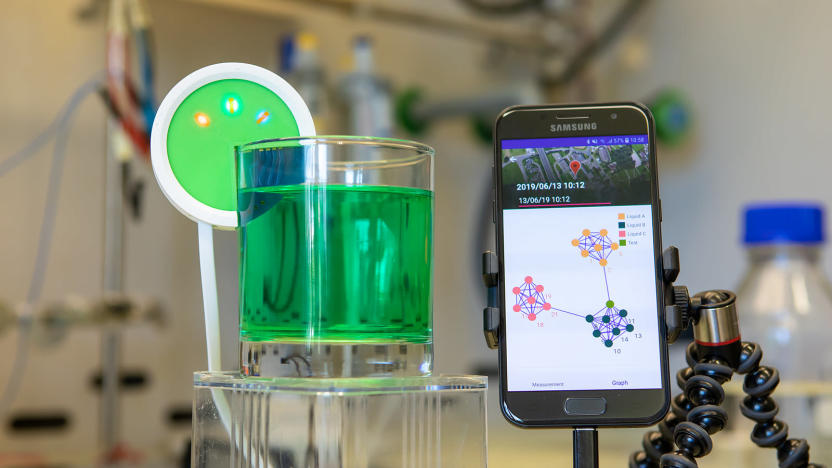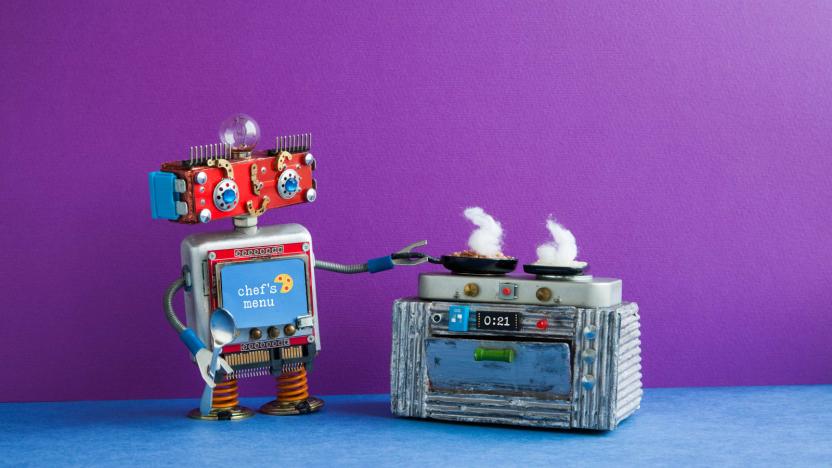IBM
Latest

51 companies tell Congress it's time to tackle data privacy
The corporate world isn't waiting around for Congress to get started on tougher data privacy laws. A group of 51 CEOs from the Business Roundtable advocacy group, including tech companies like Amazon, AT&T, IBM, Motorola and Qualcomm, have sent an open letter to House and Senate leaders asking them to pass a "comprehensive consumer data privacy law." They claim that state privacy laws vary too widely, leading to confusion for customers and potentially threatening the US' competitiveness. A federal law would reportedly bolster trust and create a "stable policy environment" where companies can craft products knowing exactly where the boundaries are.

The ISS' spherical robot helper has returned to Earth
Humans are one step closer to having robot assistants in space. The IBM- and Airbus-made CIMON (Crew Interactive Mobile Companion) robot returned to Earth on August 27th after successful testing aboard the International Space Station. The spherical machine demonstrated both its AI skills (such as recognizing astronauts and offering instructions) as well as its ability to float through the ISS. Don't think this is the end to the experiments, though -- this is really just the start.

Google, Intel and Microsoft form data protection consortium
It's common to secure data when its sitting put or flying to its destination, but not so much when you're actually using it -- there's still a risk someone could peek at your content while you work. Industry heavyweights might help keep your info secure at every step, though. Google, Intel, Microsoft and seven other companies have formed the Confidential Computing Consortium to help in "defining and accelerating" open source tech that delivers truly private data access. Ideally, data will always be encrypted or otherwise limited to whoever is meant to be looking.

IBM built a robotic tongue to taste test hazardous chemicals
The pace of technical advancement in computer vision systems over the past few years has been nothing short of astounding. The eyes of machines are quickly gaining on their biological counterparts with 1,000-fps vision, the ability to figure out what they're looking at without human aid, and electronic eyes that can be outfitted to any robot. The same goes for tactile sensation and natural language processing, a robot's hands and ears. Research into machine tasting, however, has not seen quite the same degree of enthusiasm. But a new proof-of-concept from IBM Research could give field scientists access to a digital sommelier's palate, even when they're taste testing wastewater for hazardous contaminants.

MIT made an AI that can detect and create fake images
Creating digital renderings and editing images can take hours, but researchers from MIT and IBM want to change that. They've trained AI to generate photographic images from scratch and to intelligently edit objects inside them. While this could be beneficial for artists and designers, it also offers insight into how neural networks learn context, and the team hopes to leverage the tool to spot fake or altered images.

IBM AI helps predict breast cancer a year before it appears
IBM isn't just using AI to predict diabetes. Its researchers have developed an AI model that can predict malignant breast cancer within a year with an 87 percent accuracy rate comparable to human radiologists. While there are already AI prediction methods that rely on either mammogram images or medical records, IBM's stands out by using both -- and it's potentially more reliable as a result.

AI could be the key to catching Type 1 diabetes much earlier
Will AI lead to a quicker diagnosis of diabetes, a condition often called the silent killer? IBM researchers are hoping so. They recently announced an AI-powered screening tool that could potentially identify Type 1 diabetes antibodies in people's blood.

IBM hopes AI can speed up glaucoma treatment
A glaucoma diagnosis typically requires multiple painstaking tests to accurately gauge vision loss. If IBM has its way, though, you might just have to ask a computer to do the hard work. The company's research wing has used AI to discover retina imaging data that could be used to detect and manage glaucoma. A deep learning system estimates the visual field index (the degree of visual function) based on a single 3D scan of the optic nerve, giving an idea of how glaucoma has developed with greater accuracy than conventional tests.

Every shot from the Masters will be posted online within five minutes
Golf fans who are planning to watch the Masters this weekend will have yet more ways to check out the action. For the first time at a golf tournament, practically every one of the more than 20,000 shots from the first major of the year will be available to view on the Masters website and app within five minutes of a player striking the ball.

Microsoft and Amazon will fight for the Pentagon's $10B cloud contract
Amazon and Microsoft are the two final companies in the running for the Defense Department's $10 billion cloud computing contract. The Pentagon's migration to the cloud, known as the JEDI project, was announced in 2017, with some of the biggest companies in the world competing for the prize ever since (although Google sat it out, citing "AI principles").

Apple, IBM heads join White House panel on workforce automation
Apple CEO Tim Cook and IBM CEO Ginni Rometty will be among the company executives who will be joining a Trump administration advisory board set to deal with the effects of artificial intelligence and automation on the workforce. According to Reuters, the panel will be co-chaired by Ivanka Trump and Commerce Secretary Wilbur Ross. Board members will serve until 2020.

IBM AI fails to beat human debating champion
After suffering defeat to AI at Go and Dota 2, the battle between man and machine was starting to look a little one-sided. But a human has finally notched up a win against our future robot overlords. Champion debater Harish Natarajan triumphed in a live showdown against IBM's Miss Debater AI at the company's Think Conference in San Francisco on Monday. The 2012 European Debate winner and IBM's black monolith exchanged quick retorts on pre-school subsidies for 25 minutes before the crowd hailed Natarajan the victor. You can watch the debate in full below.

How McCormick and IBM will use AI to create the next big spice
It's not easy crafting the next taste sensation. Nobody hops out of bed in the morning, thinks to themselves, "Today, I'm going to invent the next Oreo," and actually follows through on it. Even training in the skills necessary to become a professional food product developer can take the better park of two decades, much less creating and testing the thousands of flavor iterations needed to dial in on the perfect taste that will finally unseat Cool Ranch Doritos. But thanks to IBM's IBM Research AI for Product Composition, spice manufacturer McCormick & Company's R&D the team is leveraging machine learning to cut the time it takes to develop new flavors by up to 70 percent.

McCormick hands over its spice R&D to IBM's AI
McCormick might be a brand name you recognize from its herbs and spices, French's Classic Yellow Mustard or even "edible" KFC-flavored nail polish. For more than 40 years, it's recorded reams of data on product formulas, customer taste preferences and flavor palettes. Now it's harnessing artificial intelligence in flavor development.

Amazon's facial-analysis tool showed gender and race bias, says study
Research suggests Amazon's facial analysis algorithms have struggled with gender and racial bias. The MIT Media Lab found Rekognition had no trouble at all in correctly pinpointing the gender of lighter-skinned men but it classified women as men almost a fifth of the time and darker-skinned women as men on almost one out of three occasions. IBM and Microsoft software performed better than Amazon's tool -- Microsoft's solution mistakenly thought darker-skinned women were men 1.5 percent of the time.

AI is better at bluffing than professional gamblers
The act of gambling on games of chance has been around for as long as the games themselves. For as long as there's been money to be made wagering on the uncertain outcomes of these events, bettors have been leveraging mathematics to give them an edge on the house. As gaming has moved from bookies and casinos into the digital realm, gamblers are beginning to use modern computing techniques, especially AI and machine learning (ML), to increase their odds of winning. But that betting blade cuts both ways, as researchers work to design artificial intelligences capable of beating professional players at their own game -- and even out-wagering sportsbooks.

IBM is turning to your smartphone to improve weather forecasts
IBM and its subsidiary The Weather Company are working on a new weather forecasting system, one that they say will boost forecast accuracy quite a bit. It's called the Global High-Resolution Atmospheric Forecasting System, or GRAF, and it will pull data from weather stations, aircraft sensors and smartphone pressure sensors -- a massive amount of information that will be analyzed by the IBM technology that powers the US Department of Energy's powerful Summit and Sierra supercomputers.

IBM's latest quantum computer is a 20-qubit work of art
Last year, IBM hauled a 50-qubit quantum computer to CES. Or, rather, it brought the eye-catching bits -- an intricate collection of tubes and wires that resembled a steampunk chandelier -- and left the more cumbersome cooling and power-management parts at home. The complete system, housed at a research lab in Yorktown Heights, New York, was spread out over a large room. It was a functional but totally inelegant design, according to Bob Sutor, vice president of IBM Q Strategy and ecosystem.

LA sues Weather Channel app owner over 'fraudulent' data use
Los Angeles' city attorney has filed a lawsuit against the company behind The Weather Channel app, claiming the app didn't adequately disclose to users how their location information would be used. The lawsuit calls The Weather Company's practices "fraudulent and deceptive" and says they violate California's Unfair Competition Law. "For years, TWC has deceptively used its Weather Channel app to amass its users' private, personal geolocation data -- tracking minute details about its users' locations throughout the day and night, all while leading users to believe that their data will only be used to provide them with 'personalized local weather data, alerts and forecasts," says the suit.

2018 is the year AI got its eyes
Computer scientists have spent more than two decades teaching, training and developing machines to see the world around them. Only recently have the artificial eyes begun to match (and occasionally exceed) their biological predecessors. 2018 has seen marked improvement in two areas of AI image processing: facial-recognition technology in both commerce and security, and image generation in -- of all fields -- art.









